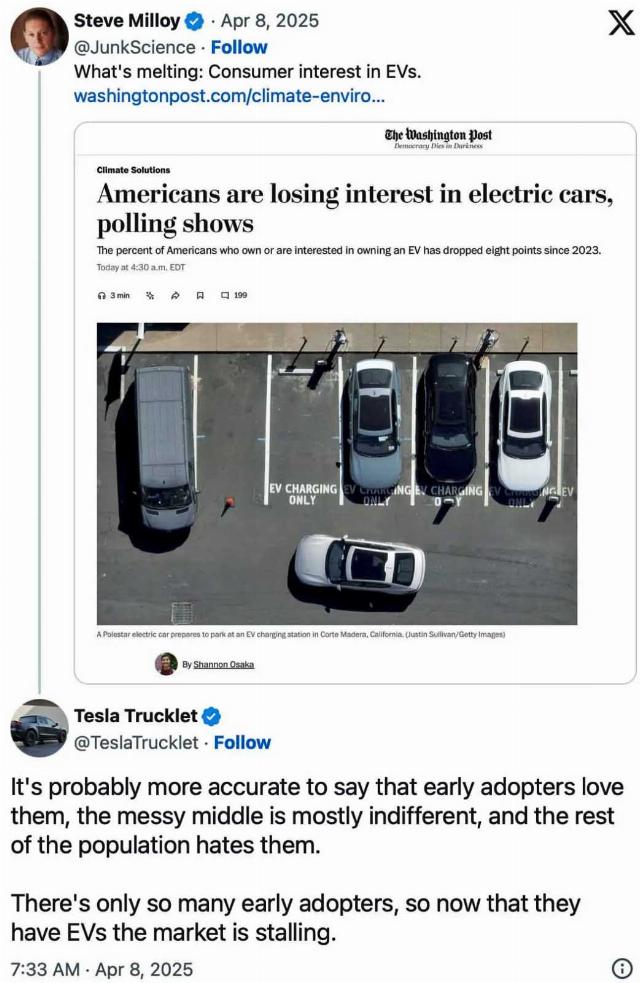Electric vehicle subsidies end; Colorado steps up
My fellow editor Olivia Murray and I often write about the electric vehicle—EV--scam/debacle, though not lately. With Donald Trump’s 2024 victory, most automakers sighed and began to acknowledge the reality they’d avoided for years:
*Electric vehicles aren’t ready for prime time. They’re far more expensive and far less useful than comparable conventionally powered vehicles.
*The public has finally caught on to that reality. They’re not buying vehicles they can’t afford that don’t meet their needs.
*Even with a $7500 federal tax credit, EVs were purchased by the top 7% of households in income.
*Many dealers refused to stock EVs and those that did saw them sitting idle on their lots, producing no revenue.
*With Trump ending the tax credit on September 30, 2025, manufacturers knew the billions they’d already lost on EVs would skyrocket to levels their stockholders wouldn’t abide.

Graphic: X Post
America’s big three announced cancellations of grandiose EV plans, and huge reductions of those still being produced, which was likely a face-saving way to avoid admitting how much money they lost appeasing leftists while allowing their EV offerings to quietly die. To be sure, EVs will continue to be made. China is cranking out cargo ship loads of low-cost models, and Tesla appears to continue to be profitable, but reality has once again overcome climate hysteria, and most Americans aren’t going to buy EVs.
Colorado, a last bastion of climate/green orthodoxy, keeps shocking the dying EV patient:
Colorado’s governor just made this statement “The market has made it clear, EVs (electric vehicles) are here to stay.”
I agree with him. Electric cars, unlike 8-track tapes and rotary-dial phones, will continue to be available to consumers for a long, long time. Cool. But why he made the statement puzzles me. He did so while touting his decision that the state will increase one of its subsidies to buy a new EV from $6,000 to $9,000.
Wait a second. Which one is it? Has the market made clear electric vehicles are “here to stay”? Or do we need to increase the EV subsidy by a third to keep its market alive?
The author, Jon Caldara, notes the Colorado legislature has given Governor Jared Polis sole power to subsidize EVs. Caldara bought a Nissan Leaf. Actually, the public did, reducing his outlay for that $30,000 dollar EV to something less than $14,000.
Can you really declare a product is “here to stay” when people will only buy it if someone else pays for most of it?
Caldara is clearly reality-based:
In snow it drives like a garbage dumpster sliding down a hill. It has little space to carry much of anything. Though I’m buying less gas, my electric bill went nuts. But what’s known as “range anxiety,” that’s the worst.
I’ve limped this car home with only 2% battery power left, making it more anxiety-powered than electric-powered. It’s no good for trips that might go long. So, like every other electric car owner, I also have a gas-powered car for, you know, life.
The statistics prove it. Subsidies to buy an EV go to people who already can afford a car.
And he’s right, so Polis to the rescue!
Any member of the Green Industrial Complex reading this is now yelling, “Hey jerk, this new Colorado EV giveaway is income-dependent!” Indeed, it is. Your income must be 80% or less of your “area median income.”
So, according to the Colorado Energy Office, in my poverty-stricken county of Boulder a household of four can make $120,480 a year and still receive the $9,000 gift. Nice.
This subsidy is supposed to enable those of little means to buy EVs, which will supposedly save them all kinds of money, except, you know, on electricity. Like all blue states, the Colorado cost of living is through the roof, but $120,000+ is still a good chunk of change. Besides, poor people, living largely in apartments, don’t have charger access, and even if they owned a home, can’t afford $10,000 or so to have a fast charger installed. It takes days to charge an EV if all that’s available is wall current.
But the best part is Colorado is facing a $250 million budget shortfall, so the logical thing to do it to subsidize EVs for people who don’t need the money to buy an EV. Caldara has his politician’s number:
Our leaders want to spend our money on social engineering, not the core functions of state government.
But of course.
Become a subscriber and get our weekly, Friday newsletter with unique content from our editors. These essays alone are worth the cost of the subscription.
Mike McDaniel is a USAF veteran, classically trained musician, Japanese and European fencer, life-long athlete, firearm instructor, retired police officer and high school and college English teacher. He is a published author and blogger. His home blog is Stately McDaniel Manor.